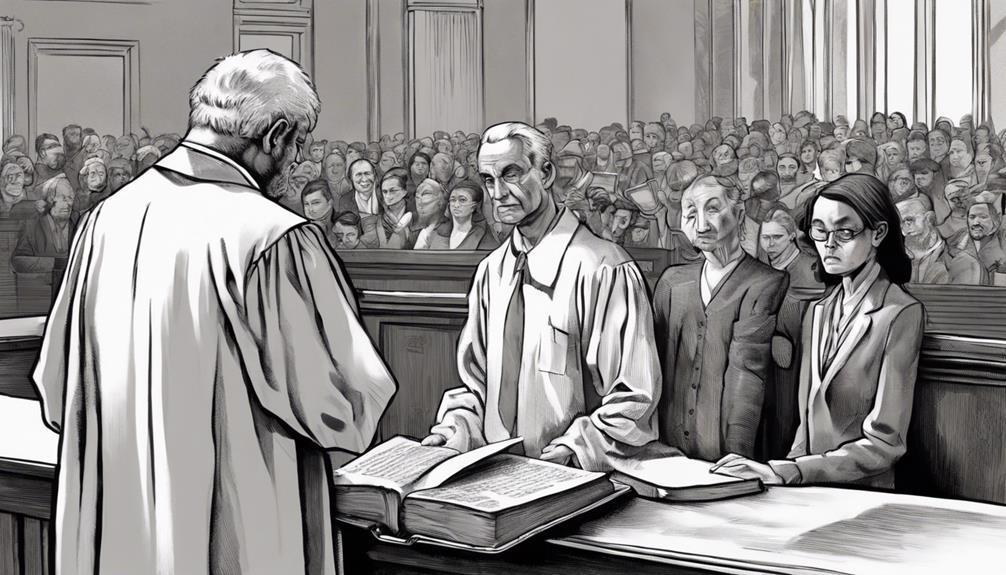Understanding aggravated perjury involves knowingly making false statements under oath in official proceedings. These lies must be significant, able to impact case outcomes, and carry severe legal repercussions. In Texas, aggravated perjury is a third-degree felony with penalties of 2 to 10 years in prison and fines up to $10,000. Retracting false statements before exposure can be a defense, but proving intent to deceive is essential. Different from traditional perjury, aggravated perjury pertains to statements that influence legal proceedings. Exploring these distinctions and seeking legal guidance can provide further insight into the complexities of this offense.
Key Takeaways
- Aggravated perjury involves presenting false statements under oath in official proceedings.
- The false statement must be material and capable of influencing the outcome.
- It is a third-degree felony in Texas with penalties of 2 to 10 years imprisonment and fines up to $10,000.
- Retraction of false statements before exposure can be a valid defense.
- Consulting with an attorney is crucial for individuals facing allegations of aggravated perjury.
Definition of Aggravated Perjury
Understanding the Definition of Aggravated Perjury is essential for grasping the legal implications of making false statements under oath in Texas.
Aggravated perjury, in the state of Texas, entails knowingly presenting false statements while under oath in connection with an official proceeding. For the statement to qualify as aggravated perjury, it must be material, meaning it could influence the course or outcome of the official proceeding. This distinction is vital, as it separates mere falsehoods from the serious offense of aggravated perjury.
Classified as a third-degree felony, aggravated perjury in Texas carries severe penalties, including imprisonment ranging from 2 to 10 years and fines up to $10,000. Importantly, retracting a false statement before its exposure can potentially serve as a defense against aggravated perjury charges.
The crux of determining aggravated perjury lies in the materiality of the false statement, emphasizing its significance in potentially affecting case outcomes.
Elements of Aggravated Perjury

To comprehend the offense of aggravated perjury in Texas, one must understand the specific elements that constitute this serious crime.
- The false statement made must be essential, meaning it could impact the official proceeding's course or outcome.
- Retracting a false statement before exposure can serve as a defense against aggravated perjury charges.
- Essentiality in these cases refers to statements that obstruct justice, not trivial falsifications.
- Aggravated perjury often occurs when an individual lies under oath as a witness in a court proceeding.
These elements are vital in determining whether someone has committed aggravated perjury in Texas.
Understanding the significance of material false statements and how they can influence official proceedings is essential in grasping the severity of this offense.
Retracting false statements may mitigate charges, but the core focus remains on the impact such lies can have on the pursuit of justice.
Penalties for Aggravated Perjury

Aggravated perjury in Texas can lead to severe consequences, including a third-degree felony charge with a prison sentence ranging from 2 to 10 years. Offenders may face fines up to $10,000, and judges have the authority to impose severe penalties.
It's important to understand the legal implications and seriousness of committing aggravated perjury.
Penalty Implications
Perjury offenders in Texas face significant penalties for their actions, including a possible prison sentence of 2 to 10 years and a fine of up to $10,000.
Understanding the penalty implications of aggravated perjury is vital, as it sheds light on the severity of consequences individuals may encounter. Here are key points to take into account:
- Aggravated perjury is classified as a third-degree felony in Texas.
- The punishment range underscores the seriousness of making false statements in official proceedings.
- Conviction can lead to a state prison sentence of up to 10 years, impacting freedom and future opportunities.
- Judges hold the authority to impose a maximum fine of $10,000 in addition to imprisonment for offenders.
Legal Consequences
Understanding the legal consequences of aggravated perjury in Texas is vital for individuals involved in legal proceedings. Aggravated perjury, classified as a third-degree felony in Texas, carries severe penalties. Those found guilty can face imprisonment ranging from 2 to 10 years and a fine of up to $10,000. Judges have the discretion to impose harsh sentences at the upper end of this range.
However, in some cases, offenders may be granted probation or deferred adjudication without a conviction. It's essential to recognize that aggravated perjury is a serious felony offense that greatly impacts legal proceedings. These penalties underscore the importance of truthfulness in legal contexts and highlight the gravity of providing false statements under oath.
Defenses Against Aggravated Perjury

Defendants facing allegations of aggravated perjury may assert various defenses to challenge the accusations against them. When defending against aggravated perjury charges, individuals can consider the following strategies:
- Retraction of False Statement: Retracting a false statement before it's exposed can be a valid defense.
- Intent Inference: Intent to deceive can be inferred from the circumstances surrounding the false statement.
- Witness Testimony: At least two witnesses must testify to prove a false statement in an aggravated perjury case.
- Lack of Intent and Materiality: Defenses may include lack of intent to deceive and the argument that the statement wasn't material.
It is essential for individuals facing allegations of aggravated perjury to consult with an attorney before signing any statement required to be given under oath. Understanding potential defenses is important in dealing with the legal complexities of such charges.
Aggravated Perjury Vs. Perjury

Facing aggravated perjury charges presents a distinct legal challenge compared to the offense of perjury. While perjury involves making false statements under oath, aggravated perjury goes a step further by specifically impacting the outcome of an official proceeding. In Texas, aggravated perjury is classified as a third-degree felony, carrying harsher penalties than traditional perjury.
Perjury typically results in lighter consequences as it doesn't necessarily influence the course of a legal case. Understanding this distinction is vital in determining the severity of the offense and the potential legal ramifications one may face. Aggravated perjury can lead to imprisonment ranging from 2 to 10 years and fines up to $10,000, making it a more serious crime than perjury.
Differentiating between the two offenses is essential for individuals involved in legal proceedings to grasp the gravity of their actions and the corresponding penalties they may encounter.
Aggravated Perjury in Texas Law

Aggravated perjury in Texas involves making a false statement under oath with the intent to deceive in an official proceeding. These false statements must be material, impacting the course or outcome of the proceeding.
Understanding Texas perjury laws, the penalties for perjury, and available defenses against perjury is important in handling legal matters in the state.
Texas Perjury Laws
In Texas, perjury laws encompass a stringent definition of aggravated perjury when a false statement is made under oath in connection with an official proceeding. Aggravated perjury in Texas involves specific criteria and consequences:
- The false statement must be made with the intent to deceive and an understanding of its meaning.
- The statement must be material, capable of influencing the course or outcome of the official proceeding.
- Official proceedings where aggravated perjury can occur include court hearings, depositions, divorce proceedings, and grand jury testimonies.
- Trivial falsifications aren't considered material statements in aggravated perjury cases.
Penalties for Perjury
When false statements are made under oath in official proceedings in Texas, the importance of the offense becomes evident through the classification of aggravated perjury as a third-degree felony. This classification entails penalties that include imprisonment ranging from two to ten years.
In addition to imprisonment, individuals convicted of aggravated perjury may face a fine of up to $10,000. However, there are alternatives to imprisonment such as probation or deferred adjudication without conviction.
It's vital to understand that aggravated perjury can have a significant impact on legal proceedings and carries severe consequences in Texas. Offenders must be aware of the serious penalties associated with making false statements under oath to deter such actions and uphold the integrity of the legal system.
Defenses Against Perjury
Defenses against perjury in Texas law often include the affirmative defense of retraction for cases of aggravated perjury. When facing allegations of aggravated perjury, individuals may utilize this defense strategy to mitigate their culpability.
Here are some key points to take into account:
- Retracting a false statement before exposure can be a valid defense.
- Two witnesses are typically required to prove a false statement in court.
- Intent to deceive can be inferred from the circumstances surrounding the false statement.
- The statute of limitations for aggravated perjury in Texas is two years.
These defenses play a pivotal role in the legal proceedings related to aggravated perjury cases, highlighting the complexities of such allegations.
Seeking Legal Representation

Quickly obtaining legal representation is vital for individuals facing perjury or aggravated perjury accusations.
In Texas, retracting a false statement before it's exposed can serve as a defense against aggravated perjury charges. The key elements to prove aggravated perjury include intent to deceive and the materiality of the false statement.
When confronted with perjury allegations, seeking legal counsel promptly is important. Attorney Matt Bingham, well-versed in providing aggressive defense in perjury cases, especially in Texas, can offer valuable assistance.
It's advisable for individuals subpoenaed to testify to contact a lawyer promptly to fully comprehend their rights and explore potential defenses against perjury accusations. Understanding the gravity of the situation and the legal intricacies involved can have a significant impact on the outcome of perjury cases.
As a result, swift action in securing legal representation is paramount for those facing such serious allegations.
Frequently Asked Questions
Can a Person Be Charged With Aggravated Perjury if They Unknowingly Make a False Statement Under Oath?
Yes, a person can be charged with aggravated perjury even if they unknowingly make a false statement under oath. Ignorance of the falsehood does not exempt individuals from potential legal consequences in such cases.
Are There Any Specific Circumstances That Could Lead to a Charge of Aggravated Perjury Rather Than Regular Perjury?
In certain situations, factors like intent, impact, or repeated offenses could elevate a charge from regular perjury to aggravated perjury. These circumstances necessitate a thorough examination of the case to determine the appropriate legal action.
How Does Aggravated Perjury Differ From Other Types of Perjury Offenses, Such as Subornation of Perjury?
Aggravated perjury involves making false statements under oath with the intent to deceive. It differs from subornation of perjury, where a person induces someone else to commit perjury. Both offenses carry serious legal consequences.
Are There Any Potential Consequences for Witnesses Who Knowingly Provide False Information in a Legal Proceeding but Are Not the Ones Who Took an Oath?
Just as a ship without a rudder, witnesses who knowingly provide false information in a legal proceeding, even without taking an oath, may face consequences like being charged with perjury or obstruction of justice.
Is There a Statute of Limitations for Prosecuting Cases of Aggravated Perjury, and if So, How Long Is It?
There is a statute of limitations for prosecuting cases of aggravated perjury. The length varies depending on the jurisdiction and seriousness of the offense. Typically, it ranges from 3 to 10 years.
Conclusion
In summary, understanding aggravated perjury is essential for maneuvering the legal system. With severe penalties and specific elements to ponder, individuals must be mindful of the repercussions of making false statements under oath.
Remember, when confronted with accusations of aggravated perjury, seeking legal representation is vital for safeguarding your rights and mounting a strong defense. Can you afford to take the risk of facing these serious charges without proper legal guidance?










